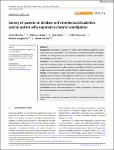Survey of parents of children with intellectual disabilities and/or autism who experience chronic constipation
| dc.contributor.author | Rooney, J | |
| dc.contributor.author | Hodge, R | |
| dc.contributor.author | Smith, J | |
| dc.contributor.author | Vanstone, K | |
| dc.contributor.author | Laugharne, R | |
| dc.contributor.author | Shankar, Rohit | |
| dc.date.accessioned | 2023-07-31T09:25:14Z | |
| dc.date.available | 2023-07-31T09:25:14Z | |
| dc.date.issued | 2023-07 | |
| dc.identifier.issn | 1468-3148 | |
| dc.identifier.issn | 1468-3148 | |
| dc.identifier.uri | https://pearl.plymouth.ac.uk/handle/10026.1/21089 | |
| dc.description.abstract |
Background: Constipation is common in children with intellectual disabilities and/or autism, but poorly researched. This study looks to understand parental knowledge, attitudes and management practices towards constipation in children with intellectual disabilities and/or autism. Methods: A cross-sectional online survey developed with patient facing organisations was circulated to parents of children with intellectual disabilities and/or autism using an exponential and non-discriminatory snowballing method for recruitment. A smaller sample were purposively sampled for their in-depth experiences. Results: Of 68 responses, people were open to discussing constipation and knowledgeable about risk factors. In the qualitative interviews, of 15 parents, they wanted to be treated as an expert in their child's care. They desired a service that was more responsive when in difficulty. While wanting more information about medication options, parents want a more holistic approach. Conclusions: Services need more emphasis on holistic management. Listening to parents and treating them as experts is important. | |
| dc.format.extent | 830-846 | |
| dc.format.medium | Print-Electronic | |
| dc.language | en | |
| dc.publisher | Wiley | |
| dc.subject | bowel problems | |
| dc.subject | constipation | |
| dc.subject | developmental disabilities | |
| dc.subject | neurodevelopmental disorders | |
| dc.subject | service access | |
| dc.title | Survey of parents of children with intellectual disabilities and/or autism who experience chronic constipation | |
| dc.type | journal-article | |
| dc.type | Journal Article | |
| plymouth.author-url | https://www.webofscience.com/api/gateway?GWVersion=2&SrcApp=PARTNER_APP&SrcAuth=LinksAMR&KeyUT=WOS:000959521900001&DestLinkType=FullRecord&DestApp=ALL_WOS&UsrCustomerID=11bb513d99f797142bcfeffcc58ea008 | |
| plymouth.issue | 4 | |
| plymouth.volume | 36 | |
| plymouth.publication-status | Published | |
| plymouth.journal | Journal of Applied Research in Intellectual Disabilities | |
| dc.identifier.doi | 10.1111/jar.13101 | |
| plymouth.organisational-group | |Plymouth | |
| plymouth.organisational-group | |Plymouth|Faculty of Health | |
| plymouth.organisational-group | |Plymouth|Users by role | |
| dc.publisher.place | England | |
| dcterms.dateAccepted | 2023-03-20 | |
| dc.date.updated | 2023-07-31T09:25:13Z | |
| dc.rights.embargodate | 2023-7-1 | |
| dc.identifier.eissn | 1468-3148 | |
| dc.rights.embargoperiod | forever | |
| rioxxterms.versionofrecord | 10.1111/jar.13101 |


